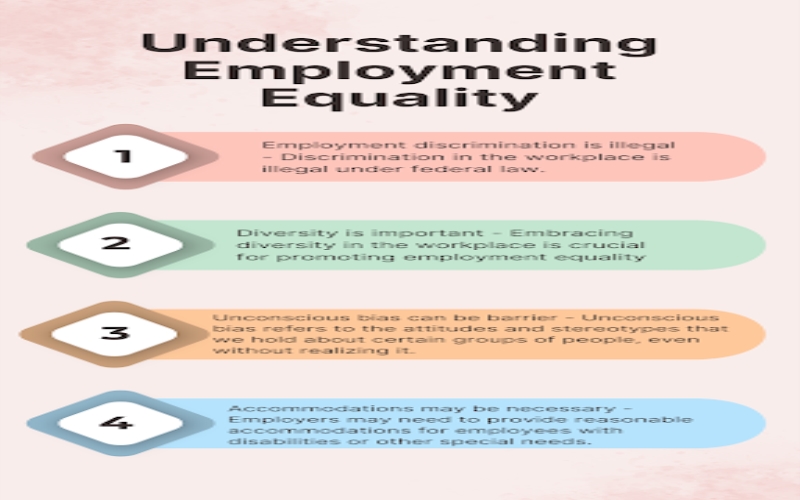Striking the right chord between Understanding Employee Rights and Restrictions asserting one’s rights as an employee and respecting the necessary restrictions imposed by employers is a delicate symphony – one that requires a nuanced understanding to harmonize the interests of both parties.
In today’s rapidly evolving workplace environment, employees and employers alike must delicately balance between rights and restrictions. While workers are entitled to fundamental protections, employers also have the responsibility to maintain a professional, ethical, and productive environment. The goal of this article is to offer a comprehensive understanding of employee rights and workplace restrictions, empowering readers to make well-informed decisions.
The Bedrock of Employee Rights
Fair Compensation: A Fundamental Entitlement
One of the most fundamental employee rights is the right to fair compensation. This encompasses the following:
- Minimum Wage and Overtime Pay: The Fair Labor Standards Act (FLSA) sets federal standards for minimum wage and overtime pay, ensuring that workers receive equitable compensation for their labor.
- Equal Pay for Equal Work: The Equal Pay Act prohibits gender-based wage discrimination, promoting pay equity and fairness in the workplace.
A Safe and Healthy Work Environment
Employees have the right to work in an environment that prioritizes their health and safety. Key aspects include:
- OSHA Regulations and Workplace Safety Standards: The Occupational Safety and Health Administration (OSHA) enforces standards and regulations to protect workers from hazardous conditions and injuries.
- Reporting Unsafe Conditions without Retaliation: Whistleblower protections allow employees to report unsafe practices without fear of reprisal.
The Right to Privacy
Privacy in the workplace is a fundamental employee right. This encompasses:
- Personal Property and Surveillance Policies: Employees have reasonable expectations of privacy regarding their personal belongings and activities within the workplace.
- Access to Personal Files and Information Confidentiality: Employers must safeguard employees’ personal information and provide access to employment records upon request.
In major metropolitan areas like Los Angeles, where the workplace landscape is vast and diverse, navigating the complexities of employee rights can be particularly challenging. Given the broad spectrum of industries and a sizable workforce, occurrences of workplace violations or disputes are not uncommon. During such situations, consulting with an experienced Los Angeles employment attorney can prove invaluable.
Employment attorneys in Los Angeles are well-versed in the intricate web of federal, state, and local laws that govern employer-employee relationships. They can provide specialized counsel on issues ranging from wage and hour disputes to discrimination claims, ensuring that your rights as an employee are protected and that you have a clear understanding of the legal recourse available to you.
Furthermore, a reputable Los Angeles employment attorney can offer strategic guidance on navigating the often-complex procedures for reporting violations or filing complaints with the appropriate government agencies, such as the Equal Employment Opportunity Commission (EEOC) or the California Department of Fair Employment and Housing (DFEH).
Understanding Workplace Restrictions
Although employee rights are crucial, workplace restrictions are equally vital for maintaining a professional and productive environment.
Code of Conduct and Ethical Guidelines
Employers often implement policies to ensure appropriate behavior and ethical practices, including:
- Professional Behavior and Conflict of Interest Policies: These guidelines outline expectations for conduct, professionalism, and the avoidance of situations that may compromise objectivity or integrity.
- Confidentiality Agreements and Intellectual Property Protection: These agreements protect sensitive company information and intellectual property, ensuring that trade secrets and proprietary data remain secure.
Attendance and Punctuality Expectations
Clear policies regarding attendance and punctuality are critical for operational efficiency and fairness:
- Tardiness and Absence Policies: These policies outline the consequences of excessive tardiness or unexcused absences, promoting accountability and minimizing disruptions.
- Leave Entitlements and Procedures: Employees must understand their rights to leave (e.g., sick leave, vacation time) and follow proper procedures for requesting and obtaining approval.
Use of Company Property and Digital Resources
Responsible use of company resources is essential for maintaining productivity and security:
- Restrictions on Personal Use of Company Equipment: Employers may limit personal use of company-owned devices, computers, or equipment to prevent misuse or potential security breaches.
- Email and Internet Usage Policies: These policies outline the appropriate use of company email systems and internet access, ensuring that digital resources are utilized for professional purposes.
Navigating Employee Rights and Employer Expectations
Striking a balance between employee rights and employer expectations is akin to a delicate dance. It is crucial to understand the following:
- The Intersection of Employee Freedom and Organizational Goals: While employees have rights, they must also respect the legitimate interests and goals of the organization they work for.
- Limitations of Employee Rights in the Workplace: Certain employee rights may be subject to reasonable limitations within the context of the workplace, such as restrictions on speech or behavior that could disrupt operations or create a hostile environment.
Procedures for Conflict Resolution and Grievances
When conflicts or disputes arise, it’s essential to follow established procedures for resolution:
- Steps for Addressing Workplace Disputes: Most organizations have a defined process for employees to voice concerns or file grievances, often involving multiple levels of review and mediation.
- Utilizing Mediation and Arbitration: In some cases, third-party mediation or arbitration may be necessary to resolve conflicts that cannot be settled internally.
Legal Framework and Enforcement
Employee rights and workplace restrictions are governed by a complex web of federal and state laws, including:
- Key Legislation: Laws such as the Fair Labor Standards Act, the Occupational Safety and Health Act, and the Americans with Disabilities Act (ADA) establish critical protections and standards for employees.
- The Role of the Equal Employment Opportunity Commission (EEOC): This federal agency enforces civil rights laws prohibiting workplace discrimination and harassment based on race, color, religion, sex, national origin, age, disability, or genetic information.
Reporting Violations and Seeking Remedies
If an employee’s rights are violated, there are avenues for reporting and seeking remedies:
- The Equal Employment Opportunity Commission (EEOC) is responsible for enforcing federal laws against workplace discrimination based on race, color, religion, sex, national origin, age, disability, or genetic information. Employees can file a charge with the EEOC if they believe they have been discriminated against.

- The Department of Labor’s Wage and Hour Division handles complaints related to minimum wage, overtime pay, and other wage-related violations under the Fair Labor Standards Act (FLSA).
- The Occupational Safety and Health Administration (OSHA) is the agency responsible for investigating complaints about unsafe or unhealthy working conditions.
Future Trends and Evolving Aspects of Employee Rights
As the workplace continues to evolve, new challenges and considerations emerge regarding employee rights and workplace restrictions.
Remote Work and Digital Rights
The rise of remote work has introduced new complexities:
- New Challenges and Considerations for Employee Rights in Remote Settings: Issues such as monitoring productivity, ensuring data privacy, and maintaining work-life balance have become critical concerns for remote employees.
- Data Privacy and Digital Monitoring Concerns: As employers increasingly rely on digital tools to monitor remote workers, there is a need to balance productivity tracking with employee privacy rights.
The Gig Economy and Contractual Workers
The growth of the gig economy and non-traditional employment models has raised questions about worker protections:
- Understanding Rights and Restrictions for Non-Traditional Employment Models: Gig workers and independent contractors operate under different legal frameworks, and navigating their rights and limitations can be complex.
- Navigating Labor Laws and Protections for Gig Workers: Ongoing debates and legislative efforts aim to address the unique challenges faced by gig workers, ensuring they have access to appropriate protections and benefits.
Frequently Asked Questions
1. What constitutes wrongful termination, and what are my rights if I believe I’ve been wrongfully dismissed?
Wrongful termination refers to an employee’s dismissal in violation of federal, state, or contractual laws and regulations. If you believe you’ve been wrongfully terminated, you may have grounds to file a complaint with the Equal Employment Opportunity Commission (EEOC) or seek legal counsel to explore your options for reinstatement, back pay, or other remedies.
2. How does the law protect me against workplace discrimination and harassment, and what steps can I take if I’m a victim?
Federal and state laws prohibit discrimination based on protected characteristics such as race, color, religion, sex, national origin, age, disability, or genetic information. If you experience discrimination or harassment, document the incidents, report them through your company’s complaint procedure, and file a charge with the EEOC if the issue is not resolved internally.
3. Are there limitations on my employer’s right to monitor my communications and activities at work?
While employers have a legitimate interest in monitoring workplace activities and communications to ensure productivity and compliance, there are limitations on their ability to invade employee privacy. Monitoring should be reasonable and comply with applicable laws, and employees generally have an expectation of privacy regarding personal communications and activities unrelated to work.
Conclusion: Empower Yourself with Knowledge
In today’s dynamic workplace, understanding your rights and responsibilities as an employee is paramount. By educating yourself on the legal frameworks, policies, and best practices, you can navigate the complexities of employee rights and workplace restrictions with confidence.
Remember, open communication, adherence to established procedures, and a willingness to seek guidance or legal counsel when necessary are key to protecting your rights and resolving conflicts effectively. Embrace this knowledge as a tool for empowerment, and stay informed about evolving trends that shape the future of employee rights and workplace dynamics.

